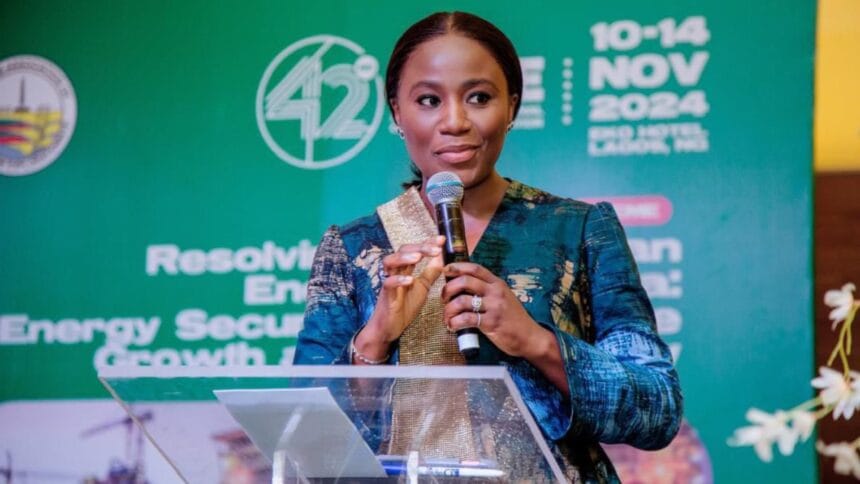She stated, “Nigeria’s deepwater oil projects now deliver competitive returns, positioning Nigeria from the bottom quartile to the top three globally, and with the new fiscal framework, we are set to unlock significant investment, boosting our energy future and driving sustainable growth for Africa.”
“For the first time in our history, we now have a fiscal framework in place for deepwater gas,” Verheijen said. indexed countries globally.
Verheijen underscored the strategic steps taken to attract and retain the IOCs’ “high-powered resilient capital and technical capacity” in Nigeria’s deepwater oil and non-associated gas sectors, essential to strengthening supply reliability to export markets.
“We moved first to address the security challenges affecting onshore oil and gas,” she added, referencing the collaboration between the Office of the National Security Adviser (ONSA) and key operators to develop data-driven, targeted security directives.
“These measures have directly improved the uptime of the Trans Niger Pipeline in the eastern Niger Delta, and today, all operating companies along the TNP can produce into this major trunkline,” she noted.
“Over the past 18 months, President Tinubu’s administration has implemented an ambitious reform program in the energy sector, addressing real bottlenecks and advancing key projects.
In April 2024, we reached a Final Investment Decision (FID) on the Ubeta Non-Associated Gas project, a half-a-billion-dollar project that has been unlocked after being discovered in 1965, now poised to deliver prosperity to millions of Nigerians.
“We are also gearing up for Nigeria’s first FID on a greenfield deepwater development since the Egina project in 2013.
“Looking ahead to 2025, we expect the investment momentum to quicken, demonstrating that President Tinubu’s energy reform agenda is truly revolutionary.
“Our challenges are addressable and fixable. These new investments will have a significant impact on the Nigerian economy, driving foreign exchange inflows, supporting exchange rate management, stabilizing the macroeconomy, and benefiting local economies through increased construction spending and hiring.
Furthermore, the infrastructure being developed will lower future project costs and ensure higher returns, creating a virtuous cycle of investment.
“While it’s still early days for our reform journey, I remain optimistic—we must be, to do this job. We look to the future with excitement, knowing that the right decisions will yield the right results,” she stated.
Mrs. Verheijen further stated that the government has focused on enhancing Nigeria’s cost and fiscal competitiveness.
She said, “Post-PIA analysis revealed that we needed to be more competitive in deepwater and non-associated gas (NAG), which are crucial to achieving our long-term goals of 4 million barrels per day, maintaining our position as Africa’s leading LNG exporter, and driving gas-fired industrialization.
“Through extensive engagements, benchmarking against regional and global competitors, and rigorous analysis—including our intense modeling sessions—we designed fiscal incentives to improve our competitiveness in global capital allocation.
“These incentives are guided by four key principles: they are output-based, not cost-based, ensuring alignment with Nigeria’s fiscal policy; they carefully consider government revenues, ensuring no negative impact on existing income; they focus on ease of implementation; and they offer flexibility to tailor incentives based on the size and scope of various projects,” she stated.
Verheijen speaking on the Presidential directives issued in February 2024, she stated, ‘These directives are designed to signal that a new era is dawning in Nigeria, and we are determined to make up for lost time and missed opportunities.
“Directive 40 outlines incentives for onshore and shallow water non-associated gas (NAG), midstream gas investments, and competitive tax incentives for deepwater oil and gas. We coordinated multi-agency implementation in record time and finalized the deepwater incentives on October 1st.
“Directives 41 and 42 focus on improving cost efficiency and project execution by reducing contracting timelines to a maximum of six months, eliminating middlemen who contribute to Nigeria’s 40% cost premium, and empowering local entrepreneurs with the capacity to drive projects.
“Additionally, we’ve raised the threshold for operator approval from NNPCL from $500,000 in Joint Operating Agreements (JOAs) and $250,000 in Production Sharing Contracts (PSCs) to $10 million, streamlining the approval process and facilitating quicker project execution,’” she said.
To unlock this and other initiatives, Mrs. Verheijen emphasized three key insights driving President Tinubu’s energy reform agenda.
According to her, President Tinubu has a very clear vision for the oil and gas industry, and for introducing new thinking in the public sector.
She stated that her team has recognized the need to shift public sector thinking from short-term approached.
Mrs. Verheijen further emphasized that, in her role as Adviser on Energy to the President, her primary focus is to drive the vision with clear, credible messaging that is consistently updated and addresses the concerns of investors and stakeholders.




